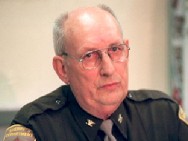'Corrupt to the Core' Virginia Sheriff Indicted on Drug and Racketeering ChargesHenry County Sheriff and 12 of his Deputies Accused of Sellling Pot and Crack Cocaine, and Money LaunderingBy PIERRE THOMAS and JASON RYAN ABC News Nov. 03, 2006 |
Popular 
Trump Bombs Three Iranian Nuclear Sites, Calls for 'Peace' After Expanding War

Opponents of Israel Are All Russian and Iranian Bots, ADL-Funded Group 'NCRI' Says

Report: U.S. Gave Iran Advance Notice of 'One-Off' Strike on Nuclear Sites

Pentagon Official Purged From Joint Chiefs of Staff for Posts Calling Israel 'Our Worst Ally'

Ted Cruz Reveals U.S. Helping Israel Carry Out Military Strikes on Iran
  Nov.2, 2006— The federal government has declared a Virginia sheriff and his deputies corrupt to the core. Nov.2, 2006— The federal government has declared a Virginia sheriff and his deputies corrupt to the core.Today Henry County Sheriff Harold Cassell and 12 of his deputies were charged with dealing crack-cocaine, marijuana and ketamine, which is commonly called the "date rape drug." Cassell has been the sheriff of Henry County since 1992 . The indictments culminate a five-year Drug Enforcement Administration investigation into accusations of corruption. More than 20 individuals, including the 12 deputies, have been indicted in the drug distribution and money laundering ring. A key allegation is that officers took confiscated drugs, issued fake destruction orders and then sold the stolen contraband. Officials said this is one of the more disturbing, systemic cases of police corruption they have ever seen. According to an indictment unsealed today, the group allegedly sold multiple kilograms of cocaine and hundreds of pounds of marijuana. "As a public servant, I am deeply disturbed by the actions of these individuals, especially [those of] the law enforcement officers arrested today," said Shawn A. Johnson, special agent in charge of the DEA's Washington division. "Those who betray the public trust insult the integrity and honor of all police officers who risk their lives upholding the law. The DEA joins with the Virginia State Police, the Federal Bureau of Investigation, and the United States Postal Inspection Service to send a clear message that their disgraceful acts will never be tolerated," Johnson added. Henry County is in south-central Virginia, near the Carolina border. It is best known for the Martinsville Speedway. In March 2005, the DEA became aware that members of the sheriff's office may be linked to the ketamine drug ring and sent a controlled delivery of the drug to a house that had been a key distribution point. That house was owned by James Vaught, a sergeant who worked for Cassell. Vaught's house was rented by William Reed, a drug dealer who helped Vaught sell 2 kilograms of cocaine confiscated from a drug dealer while Vaught had been on duty. Vaught resigned from the police force that month and began to cooperate with federal investigators after federal agents arrested Reed. According to the indictment, going back as far as 2001, Cassell failed to investigate drug activity in his region, even after a DEA agent called the sheriff''s office and informed it a recovered document indicated that shipments of drugs were being sent to the region. The indictment alleges that Cassell was aware of the "various illegal activities involving HCSO {Highland County Sheriffs Office] deputies. … Cassell covered up these illegal activities by failing to pursue investigations; by agreeing to disclose sensitive law enforcement information to the offending parties." According to FBI transcripts and surveillance of conversations between Cassell and Vaught, the two men discussed interactions and the potential for the DEA to act in the investigation. At one point during a November 2, 2005, conversation, Vaught asked the sheriff to let him know if the DEA is considering action against him. In one exchange, Vaught said to the sheriff, "Only thing I ask is if anything comes up with the DEA snooping around, if you'll just let me know." Cassell told his former deputy, "If I know it, you'll know it. I can promise you." Other officers in the sheriff's office entangled in the charges included a canine handler who received cocaine and marijuana to train drug-smelling dogs. On 10 occasions, the dog handler passed the drugs to Vaught who gave them to other drug dealers he knew through Reed. The depth of the corruption also ensnared the former head of the vice squad, David King, who often falsified destruction orders for multiple kilos of cocaine and crack, and hundreds of pounds of marijuana. In reality, King was selling the drugs to members of the sheriff's office and the distribution ring. The government alleges the sheriff knew this was going on all along, and has audio transcripts to prove it. In one October 2005 conversation with one of the deputies, identified as a cooperating witness in the FBI transcripts, Cassell is told the drugs were being sold in North Carolina: Witness: "Put it this way, they were taken that night. I kept them. They never went to the vault." Cassell: OK, that that … Witness: And I sold them. Cassell: And it's gone. Witness: I sold them in North Carolina to a guy that don't even know who I am. Cassell: OK, OK … this conversation didn't even occur. |



